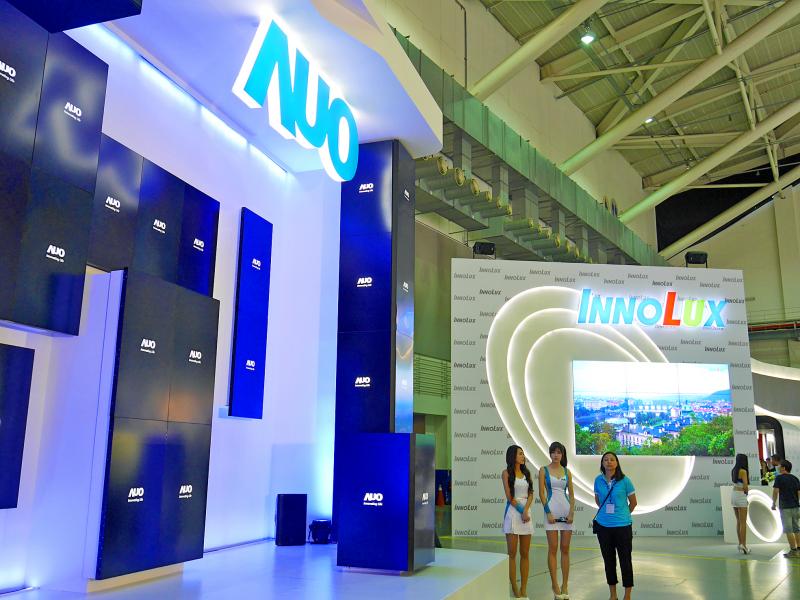The nation’s two biggest LCD panel makers, Innolux Corp (群創) and AU Optronics Corp (AUO, 友達光電), both posted annual revenue growth of more than 65 percent for last month as the stay-at-home economy continued to spur demand for panels used in notebook computers and TVs.
Innolux yesterday said its consolidated revenue surged 65.9 percent to NT$27.51 billion (US$969 million), the highest monthly revenue in about three-and-a-half years.
The figure represented a monthly increase of 1.9 percent from NT$27 billion in December last year.

Photo: Chen Mei-ying, Taipei Times
Shipments of large flat panels used in TVs and PCs decreased 4.5 percent month-on-month to 12.54 million units, while those of small panels expanded 14.3 percent month-on-month to 26.58 million units, the Miaoli-based company said.
Innolux said changes to its product portfolios and key component supply constraints affected its shipments last month.
The company said it would keep capacity adjustment flexible to satisfy customer demand.
Prices for large panels are expected to rise by a high-single-digit percentage this quarter from last quarter, extending an uptrend from the final quarter of last year, the company said.
On Monday, AUO reported that revenue last month jumped 71.8 percent to NT$26.62 billion, compared with NT$15.49 billion a year earlier, helped by higher product prices and a relatively low base of comparison a year earlier.
Compared with December last year’s NT$28.86 billion, revenue slipped 7.8 percent, as the first quarter is generally a slow season for flat-panel makers.
Total shipments also fell at a monthly pace of 7.8 percent last month, the company said.
Last week, AUO told investors that the COVID-19 pandemic would continue to drive demand for large TVs and high-specification computers this quarter, while panel supply has been tight due to robust customer demand.
However, the company warned of several challenges ahead, including a stronger New Taiwan dollar, a shortage of raw materials and insufficient personnel.
Also on Monday, panel maker HannStar Display Co (瀚宇彩晶) reported that revenue more than doubled to NT$2.48 billion last month, compared with NT$1.1 billion a year earlier.
That was a monthly decline of 3.5 percent from NT$2.57 billion in December last year, the company said.
Shipments of small and medium-sized panels dropped 7.3 percent month-on-month to 23.31 million units, while shipments of panels used in monitors contracted 21.3 percent to 237,000 units, the company said.

SEEKING CLARITY: Washington should not adopt measures that create uncertainties for ‘existing semiconductor investments,’ TSMC said referring to its US$165 billion in the US Taiwan Semiconductor Manufacturing Co (TSMC, 台積電) told the US that any future tariffs on Taiwanese semiconductors could reduce demand for chips and derail its pledge to increase its investment in Arizona. “New import restrictions could jeopardize current US leadership in the competitive technology industry and create uncertainties for many committed semiconductor capital projects in the US, including TSMC Arizona’s significant investment plan in Phoenix,” the chipmaker wrote in a letter to the US Department of Commerce. TSMC issued the warning in response to a solicitation for comments by the department on a possible tariff on semiconductor imports by US President Donald Trump’s

‘FAILED EXPORT CONTROLS’: Jensen Huang said that Washington should maximize the speed of AI diffusion, because not doing so would give competitors an advantage Nvidia Corp cofounder and chief executive officer Jensen Huang (黃仁勳) yesterday criticized the US government’s restrictions on exports of artificial intelligence (AI) chips to China, saying that the policy was a failure and would only spur China to accelerate AI development. The export controls gave China the spirit, motivation and government support to accelerate AI development, Huang told reporters at the Computex trade show in Taipei. The competition in China is already intense, given its strong software capabilities, extensive technology ecosystems and work efficiency, he said. “All in all, the export controls were a failure. The facts would suggest it,” he said. “The US

The government has launched a three-pronged strategy to attract local and international talent, aiming to position Taiwan as a new global hub following Nvidia Corp’s announcement that it has chosen Taipei as the site of its Taiwan headquarters. Nvidia cofounder and CEO Jensen Huang (黃仁勳) on Monday last week announced during his keynote speech at the Computex trade show in Taipei that the Nvidia Constellation, the company’s planned Taiwan headquarters, would be located in the Beitou-Shilin Technology Park (北投士林科技園區) in Taipei. Huang’s decision to establish a base in Taiwan is “primarily due to Taiwan’s talent pool and its strength in the semiconductor

French President Emmanuel Macron has expressed gratitude to Hon Hai Precision Industry Co (鴻海精密) for its plan to invest approximately 250 million euros (US$278 million) in a joint venture in France focused on the semiconductor and space industries. On his official X account on Tuesday, Macron thanked Hon Hai, also known globally as Foxconn Technology Group (富士康科技集團), for its investment projects announced at Choose France, a flagship economic summit held on Monday to attract foreign investment. In the post, Macron included a GIF displaying the national flag of the Republic of China (Taiwan), as he did for other foreign investors, including China-based